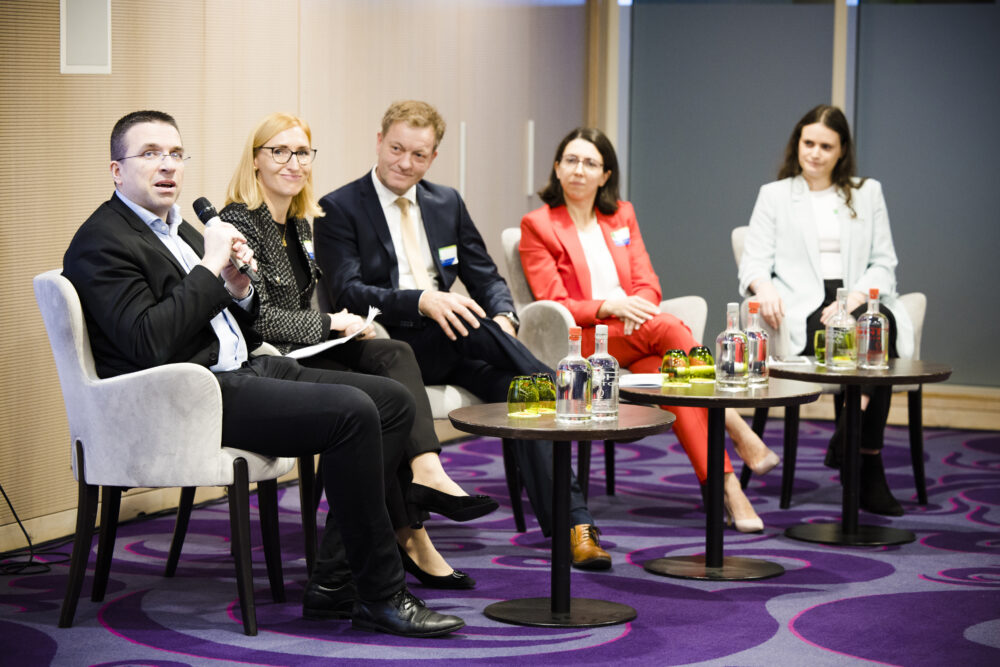Brussels, 15 November 2023 — The Association of the European Self-Care Industry (AESGP) convened key stakeholders in Brussels to discuss the economic and social value of self-care in Europe. The event showcased a high-level summary of the recently published study on the economic and social value of non-prescription medicines, and featured insights from MEP Sokol in a dynamic panel discussion involving also patients and pharmacists’ representatives.
Welcoming the participants, AESGP President Jonathan Workman acknowledged that the event’s goal was not merely to discuss the substantial benefits of self-care: to empower people, optimize health system resources, and offer a substantial return on investment for society. The goal was also to explore strategies for a more supportive, inclusive, and impactful approach to self-care, with the involvement and support of all relevant stakeholders.
In his address, MEP Sokol emphasized the evolving landscape of healthcare discussions at the EU level. Although it remains a national competence, healthcare has taken on greater importance at the EU level, particularly in the wake of the pandemic. The European Union has witnessed a surge in initiatives, notably the European Health Data Space (EHDS) and the revision of pharmaceutical legislation. MEP Sokol stressed the compatibility of innovation and patient benefits, urging a reduction in unnecessary administrative burdens while ensuring patient safety.
Presenting the key findings of the study on the social and economic value of self-care in Europe, AESGP Director General Jurate Svarcaite emphasized the profound impact of self-care. Every year in Europe, €36.72 billion are saved by self-treating 1.2 billion minor ailments, with the potential for an additional €17.60 billion if self-care practices were expanded. The study also highlights the growing shortage of healthcare professionals, stressing that without self-care, an additional 120,000 GPs would be needed, or each GP would have to work an extra 2.4 hours per day. The data and results of the study support the case for promoting more self-care in Europe. The economic model created by Prof. Uwe May and Dr. Cosima Bauer was applied to all EU Member States, Norway, Switzerland, and the United Kingdom. The overall outcomes of the study and country-specific results are now available to inform European and national health policies (for more information, please visit our page “The Economic and Social Value of Self-Care”).
Self-care, a fundamental part of healthcare systems
Welcoming the insights of the economic study, MEP Sokol stressed the importance of having relevant data to support a science-based policy going forward.
Speaking on behalf of the European Patients’ Forum (EPF), Ingrid Weindorfer echoed the study’s resonance with patients, linking it to empowerment and improved health literacy, especially when managing chronic conditions, not just minor ailments. Empowered patients can appropriately use healthcare resources and contribute to a more sustainable healthcare system. In the future, patients should play a more active role in managing their health, which is the very essence of self-care. Easy and timely access to relevant information is essential and will promote health literacy.
Ilaria Passarani, from the Pharmaceutical Group of the European Union (PGEU), representing community pharmacists, welcomed the results of the study, stressing the importance of developing policies at both national and European levels, particularly when healthcare spending is falling again, and better use of resources is needed.
Supporting self-care now and in the future
The consensus among stakeholders pointed towards a future where individuals play a more active role, digital technologies offer promising solutions for self-care, and real-world data is essential. The event highlighted the need for a holistic approach, combining incentives, health literacy, and innovative strategies to foster the growth of self-care and positively impact healthcare systems.
In the face of evolving healthcare challenges, the AESGP event provided a platform for meaningful discussions and collaborative efforts towards a more sustainable and people-centric health policy.
For further details and the complete study findings, please visit the AESGP website.

(From left to right) MEP Tomislav Sokol (EPP); Jurate Svarcaite, Director General, AESGP; Prof. Uwe May, Fresenius University of Applied Sciences, Wiesbaden, Germany / May and Bauer GbR; Ilaria Passarani, Secretary General, Pharmaceutical Group of the European Union (PGEU); Ingrid Weindorfer, Project Officer, European Patients Forum (EPF).
